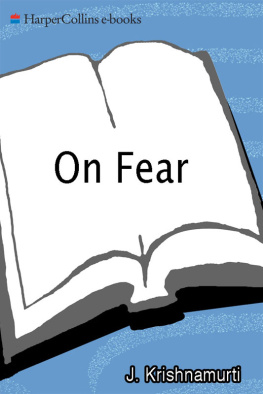Krishnamurti - School without Fear
Here you can read online Krishnamurti - School without Fear full text of the book (entire story) in english for free. Download pdf and epub, get meaning, cover and reviews about this ebook. publisher: Krishnamurti Foundation India, genre: Religion. Description of the work, (preface) as well as reviews are available. Best literature library LitArk.com created for fans of good reading and offers a wide selection of genres:
Romance novel
Science fiction
Adventure
Detective
Science
History
Home and family
Prose
Art
Politics
Computer
Non-fiction
Religion
Business
Children
Humor
Choose a favorite category and find really read worthwhile books. Enjoy immersion in the world of imagination, feel the emotions of the characters or learn something new for yourself, make an fascinating discovery.

- Book:School without Fear
- Author:
- Publisher:Krishnamurti Foundation India
- Genre:
- Rating:5 / 5
- Favourites:Add to favourites
- Your mark:
- 100
- 1
- 2
- 3
- 4
- 5
School without Fear: summary, description and annotation
We offer to read an annotation, description, summary or preface (depends on what the author of the book "School without Fear" wrote himself). If you haven't found the necessary information about the book — write in the comments, we will try to find it.
School without Fear — read online for free the complete book (whole text) full work
Below is the text of the book, divided by pages. System saving the place of the last page read, allows you to conveniently read the book "School without Fear" online for free, without having to search again every time where you left off. Put a bookmark, and you can go to the page where you finished reading at any time.
Font size:
Interval:
Bookmark:
School without Fear
Copyright 2016 Krishnamurti Foundation of America
SCHOOL
WITHOUT
FEAR
DIALOGUES WITH TEACHERS AND PARENTS
J. K RISHNAMURTI

I cannot personally lay down the principles of education.
I am not going to do it. Because, that naturally
follows from the principles of what I have been
saying in all my talks. If that is understood, that can be
applied socially, educationally, politicallyI think, for
everything in life, anything with which human
life is connected. And if you are interested in teaching,
and also in what I am saying, then you will find
out the method of teaching. Then you will find out
if what I have to say has anything.
You want me to lay down the principles; I cannot do it.
But you will find out for yourself how to work,
how to draw the principles out of what I have been
saying, if you are interested as teachers. For teachers,
it is not a peculiar profession. I do not think it is a
specialist profession: it is a human profession; you need
not be scientists who are specially drawn.
You are human beings, and from that you are to
approach ityour teaching and everything else.
J. Krishnamurti. Varanasi, 1933
CONTENTS
INTRODUCTION
The dialogues in this book are being published sixty years after Krishnamurti held them at the Rajghat Besant School, which he had founded on the banks of the Ganges in the early 1930s. From December 1954 to February 1955, he stayed on the campus and talked to the teachers and parents. Ranging from articulating his most sublime vision of life to thrashing out the practicalities of running a boarding school, he covers every conceivable aspect of education. The result is these twenty-six dialogues, which form the longest series of dialogues on education in the entire Krishnamurti repertoire.
It is worth noting that one of the earliest of Krishnamurtis commercially published books was on educationEducation and the Significance of Life, brought out in 1953. During the post-War decade and after the first flush of Indias Independence, it must have been a revelation to many that such fundamental questions as posed by Krishnamurti even existed, let alone were expressed with great clarity, in the realm of school education. Since then several of his writings, talks, and dialogues with teachers and students have been published, covering the entire gamut of educationits philosophical underpinnings, its rationale, its purpose and, above all, his own unique vision of education as not being just an activity of teaching and learning, but a way of life for the teacher as well as the taught.
The issues and questions so cogently expressed by Krishnamurti decades ago still remain; if anything, they are even more vital and relevant now than ever before. From the very beginning, he pointed out that any change in the world needs to begin with the right kind of educationeducation of not just the young but, more importantly, of the educators and parents.
In the opening dialogue, Krishnamurti spells out in no uncertain terms the intent of the schoolscarrying out his teachingsand proceeds to build the whole edifice of a school that would be consistent with his insights into life. In this sense the book is an astonishing work that looks closely at the conflicts and insecurities that a child comes up against, not only in the school but at home. Dealing with the minutiae of teaching and living in a residential school, Krishnamurti touches upon all possible issues, such as the conditioning that children inherit by the time they come to school, the motives and anxieties that drive teachers, the role of the principal and the housemaster, the difference between status and function, the right diet, clothes, games, and so on. However, the book is much more than a how-to manual for schools, and contains a much deeper examination of what educationand human existenceis all about.
Exhorting teachers not to be mechanical, Krishnamurti tells them: Each teacher who is helping the boy, if he is a true teacher, has to be aware of his capabilities and keep a record. The teacher has to be more alert, and his job is much more difficult than before, and that is perhaps what you are objecting to unconsciously. While the recurring themes of competition and comparison are discussed at length, it is interesting that Krishnamurti brings up questions that occupy todays progressive educationists as wellfor instance, should the quick and intelligent student on the one hand and the slow one on the other be taught together? He warns teachers against the dangers of segregation. There is room for much exploration here.
The central concern in many of these dialogues is the problem of fear and how it cripples learning. Early on in the dialogues, Krishnamurti says: One aspect of the teachingsit is very difficult to separate itis that fear shall be eradicated, not vaguely. Which means that any situation that might give rise to fear in the student must somehow be avoided. One of the indications is examination, the other is comparison, the other is the whole idea of giving marks, pushing, guiding... I can give you many indications of the intention: no fear, no authority, and bringing up the student with a sense of freedom.
In sum, where do all these strands lead the student and the world? We have not created a new society; he can create it. That is, if the student is given freedom and helped in freedom to discover various corrupting things in him and outside of him, he grows up with such intelligence that he can create his own world, not fit into this world, Krishnamurti says.
In later years, Krishnamurti would talk about how important it is for teachers to come off their pedestal and learn about life along with the students. For him teaching is not a specialist profession but a human profession.
***
The sources of these dialogues are not audio recordings, but short-hand notes taken down by stenographers and typed out and later authenticated by the Archives of the Krishnamurti Foundation of America. Editing has been kept to the minimum, and an occasional ambiguous phrase or sentence has been omitted to enable ease of reading. The sequence of a few dialogues has been altered to help the new reader go from the simple themes at the beginning to the more complex ones towards the end.
P. Ramesh
K.K.
THE INTENT OF THE SCHOOLS
K RISHNAMURTI (K): I think something should be made clear: the Foundation for New Education was originally started with the intention of carrying out through schools the teachings of a certain personmyself. (I am talking quite impersonally.) That was the original intention, and it is still the intention, the intention being that these schoolsthe boys and girlsare intended as a field to try out these teachings. There is no doubt about it. So far it has been neither hot nor cold. Please understand what I am talking; I am not trying to lay down the law. Even though the person who is teaching is supposed to come here three or four times, it seems important, not only for the Foundation members but also for the teachers, to understand what this intention is and carry it out drastically. Otherwise the Foundation has no meaning, no existence at all.
If it is the intention of the Foundation to carry out this experiment in this school and in Rishi Valley, please bear in mind that these two institutions are obviously not separate. Though the localities may vary, the intention is the same. That being sothat the Foundation and its members intend to carry this out fullywhat is your relationship with the Foundation and what is your relationship with the person who is giving those teachings? For our own clarity it is necessary to know, so that we can think honestly, clearly, and straight. You understand the question? Please dont put me in a position of judging or quibbling; all that I want to do is to help to make the situation very clear so that all of us know where we are.
Next pageFont size:
Interval:
Bookmark:
Similar books «School without Fear»
Look at similar books to School without Fear. We have selected literature similar in name and meaning in the hope of providing readers with more options to find new, interesting, not yet read works.
Discussion, reviews of the book School without Fear and just readers' own opinions. Leave your comments, write what you think about the work, its meaning or the main characters. Specify what exactly you liked and what you didn't like, and why you think so.







